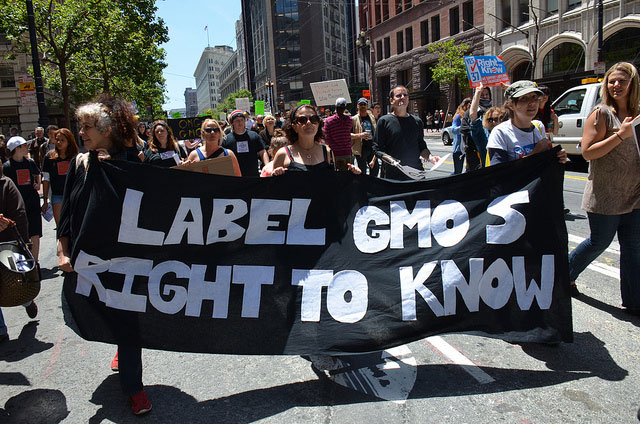
Legislation that would upend state laws mandating labels for genetically modified (GM) foods passed a key procedural vote in the Senate.
The bill, which would create a nationwide system for identifying some GM foods, cleared a motion to end debate on Wednesday, by a 65-32 vote.
A simple majority is now needed for the legislation to pass a full Senate vote, which is expected before the week is over.
Vermont, Maine, Connecticut, and Alaska have all passed legislation in recent years forcing companies to overtly label products of transgenic agriculture. They will be ordered to scrap their rules if the legislation passes both houses and is signed into law by President Obama.
Vermont’s law, the first of its kind in the nation, took effect on July 1.
As The Hill noted, the initiative would force food companies to “create QR codes that consumers scan with a smartphone to find out if a product contains GMOs.” The aforementioned states require labels to identify goods “produced with genetic engineering.”
Sen. Bernie Sanders (I-Vt.), an opponent of the legislation, called the system “confusing, misleading and unenforceable.”
The bill was also attacked by critics for exempting GM food-based goods. Products created through transgenic processes are exempt from labeling requirements under the drafted rules, if genetic material is removed before the product is sold.
Sen. Jeff Merkley (D-Ore.) pointed out on Tuesday that this could give cover to the agribusiness giant at the heart of the GM food industry.
“One thing we know is that Monsanto’s three main crops produce derivatives that do not have genetic information,” Merkley said, referring to oils and beet sugar. “This clause appears to be one that would make Monsnanto jump for joy.”
Merkley also hit out at opponents of strong GM food label rules, for claiming that the initiative is grounded in faulty science about food safety.
“For many people, it’s a question about the environmental impact,” he said, pointing to glyphosate run-off and the decline of the Monarch Butterfly population. Many GM crops are altered to withstand the heavy application of glyphosate, an ingredient used in herbicides, like Monsanto’s Roundup.
Merkley also noted glyphosate might be a carcinogen (a cancer-causing substance), according to scientific bodies. It has been found in the urine of people where it is heavily applied, he said.
“There are many different pieces where consumers have a legitimate concern and it’s their right to decide,” Merkley remarked.
Polls show that the vast majority of Americans — as many as 9-in-10 — want GM foods to be labeled.
In March, the Senate attempted to pass a bill that would have prohibited states from mandating labels identifying GM foods. A procedural motion on the legislation failed 48-49.
The bill that passed the Senate on Wednesday was largely carried by Republican senators, though 15 Democrats also approved of the measure.
Join us in defending the truth before it’s too late
The future of independent journalism is uncertain, and the consequences of losing it are too grave to ignore. To ensure Truthout remains safe, strong, and free, we need to raise $31,000 in the next 48 hours. Every dollar raised goes directly toward the costs of producing news you can trust.
Please give what you can — because by supporting us with a tax-deductible donation, you’re not just preserving a source of news, you’re helping to safeguard what’s left of our democracy.